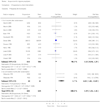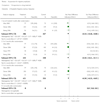Acupuncture for migraine prophylaxis
- PMID: 19160193
- PMCID: PMC3099267
- DOI: 10.1002/14651858.CD001218.pub2
Acupuncture for migraine prophylaxis
Update in
-
Acupuncture for the prevention of episodic migraine.Cochrane Database Syst Rev. 2016 Jun 28;2016(6):CD001218. doi: 10.1002/14651858.CD001218.pub3. Cochrane Database Syst Rev. 2016. PMID: 27351677 Free PMC article.
Abstract
Background: Acupuncture is often used for migraine prophylaxis but its effectiveness is still controversial. This review (along with a companion review on 'Acupuncture for tension-type headache') represents an updated version of a Cochrane review originally published in Issue 1, 2001, of The Cochrane Library.
Objectives: To investigate whether acupuncture is a) more effective than no prophylactic treatment/routine care only; b) more effective than 'sham' (placebo) acupuncture; and c) as effective as other interventions in reducing headache frequency in patients with migraine.
Search strategy: The Cochrane Pain, Palliative & Supportive Care Trials Register, CENTRAL, MEDLINE, EMBASE and the Cochrane Complementary Medicine Field Trials Register were searched to January 2008.
Selection criteria: We included randomized trials with a post-randomization observation period of at least 8 weeks that compared the clinical effects of an acupuncture intervention with a control (no prophylactic treatment or routine care only), a sham acupuncture intervention or another intervention in patients with migraine.
Data collection and analysis: Two reviewers checked eligibility; extracted information on patients, interventions, methods and results; and assessed risk of bias and quality of the acupuncture intervention. Outcomes extracted included response (outcome of primary interest), migraine attacks, migraine days, headache days and analgesic use. Pooled effect size estimates were calculated using a random-effects model.
Main results: Twenty-two trials with 4419 participants (mean 201, median 42, range 27 to 1715) met the inclusion criteria. Six trials (including two large trials with 401 and 1715 patients) compared acupuncture to no prophylactic treatment or routine care only. After 3 to 4 months patients receiving acupuncture had higher response rates and fewer headaches. The only study with long-term follow up saw no evidence that effects dissipated up to 9 months after cessation of treatment. Fourteen trials compared a 'true' acupuncture intervention with a variety of sham interventions. Pooled analyses did not show a statistically significant superiority for true acupuncture for any outcome in any of the time windows, but the results of single trials varied considerably. Four trials compared acupuncture to proven prophylactic drug treatment. Overall in these trials acupuncture was associated with slightly better outcomes and fewer adverse effects than prophylactic drug treatment. Two small low-quality trials comparing acupuncture with relaxation (alone or in combination with massage) could not be interpreted reliably.
Authors' conclusions: In the previous version of this review, evidence in support of acupuncture for migraine prophylaxis was considered promising but insufficient. Now, with 12 additional trials, there is consistent evidence that acupuncture provides additional benefit to treatment of acute migraine attacks only or to routine care. There is no evidence for an effect of 'true' acupuncture over sham interventions, though this is difficult to interpret, as exact point location could be of limited importance. Available studies suggest that acupuncture is at least as effective as, or possibly more effective than, prophylactic drug treatment, and has fewer adverse effects. Acupuncture should be considered a treatment option for patients willing to undergo this treatment.
Figures













































Update of
-
Acupuncture for idiopathic headache.Cochrane Database Syst Rev. 2001;(1):CD001218. doi: 10.1002/14651858.CD001218. Cochrane Database Syst Rev. 2001. Update in: Cochrane Database Syst Rev. 2009 Jan 21;(1):CD001218. doi: 10.1002/14651858.CD001218.pub2. PMID: 11279710 Updated.
Comment in
-
Acupuncture for migraine prophylaxis.Sao Paulo Med J. 2015 Nov-Dec;133(6):540. doi: 10.1590/1516-3180.20151336T1. Sao Paulo Med J. 2015. PMID: 26760126 Free PMC article.
-
Acupuncture for Headache. It's Still All Placebo.Headache. 2017 Jan;57(1):143-146. doi: 10.1111/head.12975. Headache. 2017. PMID: 28044338 No abstract available.
References
References to studies included in this review
-
- Alecrim-Andrade J, Maciel-Júnior JA, Carne i Cladellas X, Correa-Filho HR, Machado HC, Vasconcelos GMS. Efficacy of acupuncture in migraine attack prophylaxis: a randomized sham-controlled trial. Cephalalgia. 2005;25(10):942. - PubMed
-
- Alecrim-Andrade J, Maciel-Júnior JA, Carne i Cladellas X, Correa-Filho HR, Machado HC, Vasconcelos GMS. The long-lasting response of acupuncture treatment for migraine prophylaxis: 44 weeks' post-treatment follow-up. Cephalalgia. 2005;25(10):942–943.
-
- Alecrim-Andrade J, Maciel-Júnior JA, Cladellas XC, Correa-Filho HR, Machado HC. Acupuncture in migraine prophylaxis: a randomized sham-controlled trial. Cephalalgia. 2006;26(5):520–529. [MEDLINE: 16674760] - PubMed
-
- Alecrim-Andrade J, Maciel-Júnior JA, Carnè X, Severino Vasconcelos GM, Correa-Filho HR. Acupuncture in migraine prevention: a randomized sham controlled study with 6-months posttreatment follow-up. Clinical Journal of Pain. 2008;24(2):98–105. [MEDLINE: 18209514] - PubMed
-
- Alecrim-Andrade J, Maciel-Júnior JA, Carnè X, Vascocelos GMS, Correa-Filho HR. Acupuncture in migraine prevention: a randomized sham controlled study with 6-months post-treatment follow-up. Journal of Alternative and Complementary Medicine. 2007;13(8):891.
References to studies excluded from this review
-
- Allais G, De Lorenzo C, Quirico PE, Lupi G, Airola G, Mana O, et al. Non-pharmacological approaches to chronic headaches: transcutaneous electrical nerve stimulation, laser therapy and acupuncture in transformed migraine treatment. Neurological Sciences. 2003;24 Suppl 2:S138–S142. - PubMed
-
- Annal N, Soundappan SV, Subbu Palaniappan KMC, Chandrasekar S. Introduction of transcutaneous, low-voltage, non-pulsatile direct current (DC) therapy for migraine and chronic headaches. A comparison with transcutaneous electrical nerve stimulation (TENS) Headache Quarterly. 1992;3(4):434–437.
-
- Borglum-Jensen L, Melsen B, Borglum-Jensen S. Effect of acupuncture on headache measured by reduction in number of attacks and use of drugs. Scandinavian Journal of Dental Research. 1979;87(5):373–380. [MEDLINE: 395626] - PubMed
-
- Bäcker M, Hammes M, Sander D, Funke D, Deppe M, Tölle TR, et al. Changes of cerebrovascular response to visual stimulation in migraineurs after repetitive sessions of somatosensory stimulation (acupuncture): a pilot study. Headache. 2004;44(1):95–101. [MEDLINE: 14979891] - PubMed
-
- Coeytaux RR, Kaufman JS, Kaptchuk TJ, Chen W, Miller WC, Callahan LF, et al. A randomized controlled trial of acupuncture for chronic daily headache. Headache. 2005;45(9):1113–1123. [MEDLINE: 16178942] - PubMed
References to ongoing studies
-
- Liang F. Randomized controlled trial of treating migraine with acupuncture. ClinicalTrials.gov.
-
- Zheng Z, Xue C. Australian New Zealand Clinical Trials Registry; Effectiveness and safety of acupuncture for migraine: a randomised, single blind and sham controlled trials.
Additional references
-
- Andlin-Sobocki P, Jonsson B, Wittchen HU, Olesen J. Cost of disorders of the brain in Europe. European Journal of Neurology. 2005;12 Suppl 1:1–27. [MEDLINE: 15877774] - PubMed
-
- Benedetti F. Mechanism of placebo and placebo-related effects across diseases and treatments. Annual Review of Pharmacology and Toxicology. 2008;48:33–60. [MEDLINE: 17666008] - PubMed
-
- Bodeker G, Ong CK, Grundy C, Burford G, Shein K. Kobe, Japan: WHO Center for Health Development; 2005. WHO global atlas of traditional, complementary and alternative medicine.
-
- Burke A, Upchurch DM, Dye C, Chyu L. Acupuncture use in the United States: findings from the National Health Interview Study. Journal of Alternative and Complementary Medicine. 2006;12(7):639–648. [MEDLINE: 16970534] - PubMed
-
- Bäcker M, Gareus IK, Knoblauch NTM, Michalsen A, Dobos G. Acupuncture in the treatment of pain - hypothesis to adaptive effects [Akupunktur in der Schmerztherapie – Hypothese zu adaptiven Prozessen] Forschende Komplementärmedizin und Klassische Naturheilkunde. 2004;11(6):335–345. [MEDLINE: 15604624] - PubMed
References to other published versions of this review
-
- Melchart D, Linde K, Fischer P, White A, Allais G, Vickers A, et al. Acupuncture for recurrent headaches: a systematic review of randomized controlled trials. Cephalalgia. 1999;19(9):779–786. [erratum appears in Cephalalgia 2000 Oct;20(8):762-3] [MEDLINE: 10595286] - PubMed
-
-
Melchart D, Linde K, Berman B, White A, Vickers A, Allais G, et al. Acupuncture for idiopathic headache. Cochrane Database of Systematic Reviews. 2001;(Issue Issue 1) [Art. No.: CD001218. DOI: 10.1002/14651858.CD001218] * Indicates the major publication for the study
-
Publication types
MeSH terms
Grants and funding
LinkOut - more resources
Full Text Sources
Other Literature Sources
Medical
Miscellaneous

